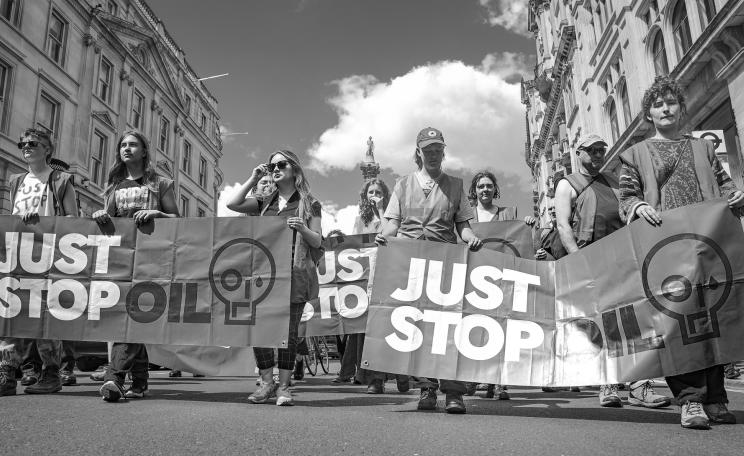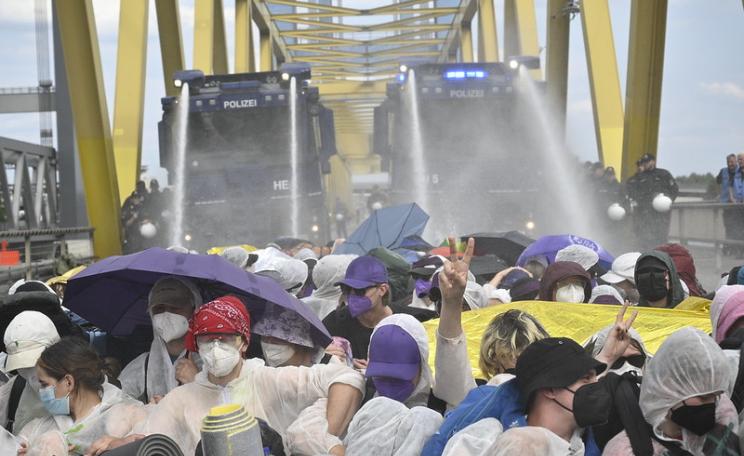What this bill proposes to do is to turn the civil offence of organising and attending a protest camp into a criminal one.
Protest camps have been a mainstay of the environmental movement for decades - because they work.
For the environmental movement you can go as far back as Greenham Common in the 1980s or Faslane Peace Camp against nuclear power and weapons.
The tactic was widely used in the 1990s as environmentalists frustrated by the institutionalisation of environmental organisations such as Greenpeace and Friends of the Earth used camps to fight against the government’s proposed road building scheme.
Coal-fired
Although some roads eventually got built, the movement against them was a success as many of the government’s plans got permanently shelved.
A generation of activists spent months and sometimes years living in camps cobbled together from whatever they could use to build structures to create shelter and warmth.
Their dedication was epitomised by the likes of Swampy, who gained headlines for living in a tunnel for a week underneath the proposed extension to the A30 in Devon before he was forcibly removed.
A number of this generation were increasingly concerned by the threat of climate change. They were now experienced in direct action tactics and protest camps and some who had then been involved in the anti-globilisation movement of the noughties went on to set up the Camp for Climate Action, otherwise known as Climate Camp which ran from 2006-2010.
Targets included coal-fired power stations, Heathrow Airport and the City of London - for its investments in fossil fuels.
Drilling
Although there was no immediate change in policy as a result of the Climate Camps, the movement organisation was a hugely important instigator in getting the issue of climate breakdown into the national press and thus into the public consciousness.
What this bill proposes to do is to turn the civil offence of organising and attending a protest camp into a criminal one.
The Climate Camps were a pivotal factor in the struggle for a phase out of the use of coal for energy. Similarly to the anti-roads movement before them, Climate Camp generated a new layer of ecological activists experienced in physically shutting down sites of ecological destruction with the use of blockades, occupations and mass civil disobedience.
Activists from the Climate Camp era went on to set up another generation of movement organisations, including Reclaim the Power (RtP) in 2013, to fight for ‘ecological, economic and social justice.’
RtP had originally planned to organise their first protest camp against a fossil gas power station in the summer of 2013. However it was rapidly becoming clear that government and industry were going to pursue the little known technique of ‘fracking’ to access previously unattainable pockets of fossil gas.
Many of the local community in Balcombe in Sussex were dismayed that their use of ‘conventional’ protest means to block this extraction technique had failed. They called out for support and RtP rapidly changed plans and mobilised around 1,500 people to attend a camp thy set up in a field near to the drilling site. There was a big protest on the road with the entrance of the site and many got arrested including the Green MP Caroline Lucas.
Resistance
Reclaim the Power then spent seven years using many temporary protest camps to support local communities fighting against fossil fuels. As well as engaging in the struggle against coal and the third runway at Heathrow activists worked alongside dedicated local activists against fracking for six years.
For years RtP activists worked with local and other anti-fracking campaigners at the fracking site of Preston New Road (PNR) in Lancashire. RtP organised temporary protest camps where activists would travel across the country and beyond to be part of a big action against fracking.
They would be fed, watered and sheltered. They would participate and deliver educational workshops and learn the skills necessary for effective direct action. They would make new friends and have intense experiences, and some would stay and remain at the two permanent protest camps at Preston New Road, engaging in the consistent direct action that happened there against Cuadrilla’s fracking site.
The camps, permanent or temporary, allowed activists to hamper Cuadrilla’s actions every step of the way. People regularly blockaded the entrance to the fracking site. People jumped onto trucks headed into the site to stop them. People lay down in the road with their arms placed in concrete tubes to stop the traffic attempting to get on and off the site.
For just over two an a half years there was always someone in a little hut opposite the site entrance on ‘Gate Watch’ noting down the comings and goings of people and vehicles onto and off the site. Through fierce resistance the anti-fracking movement controversialised the idea of fracking and brought it to the attention of the public.
Victories
The day after Caroline Lucas got arrested, anyone who picked up a paper learnt about fracking seeing her face splashed across front pages.
Over years of struggle public support for fracking dropped. But not only was the social license for fracking damaged by activists but so too were the economic conditions for it. Every step of the way activists significantly slowed down progress for the fledgling industry.
By 2019 the economic conditions for fracking were dire. Boris Johnson as prime minister made a calculated decision that it was not even in the Tories interest to pursue fracking anymore and so instituted a moratorium against it. Indeed it could have even won him some more votes in the upcoming general election.
Unconventional fossil fuels are still being pursued in the UK - for instance oil in Brockham, Surrey - but the specific technique of ‘fracking’ is no longer allowed.
This victory and the victories of our 2024 coal phase out associated with Climate Camp in the 2000s and the dropping of the vast road building policy of the 1990s can attribute their success to one key aspect: the use of protest camps.
Eviction
Along with vast amounts of dedication, protest camps were used as a springboard for direct action and are a form of direct action in and of themselves, crucial to ecological struggle. It was because of the existence of a protest camp next to Brockham Wellsite in Surrey activists were able to witness illegal drilling for oil at night from an illegally drilled sidetrack well without council planning permission.
Protest camps work in the struggle for ecological justice, which is why the government wants to criminalise their very existence with the Police, Crime and Sentencing Bill.
Currently protest camps are a civil offence: trespass. That is unless they have the explicit consent of the landowner (which was the case for one of the permanent protest camps near the fracking site in Lancashire).
For prosecution to occur, the landowner has to first know that there is an occupation on their land. They then have to go through the civil courts to get an Interim Possession Order to evict the campers. This all takes time, often weeks or months. It is rare a landowner is able to serve an eviction notice within 24 hours of recognising their land is occupied.
For the temporary protest camps that last no more than a week or two, by the time an eviction notice is served, it is too late. The activists have dismantled their camp and gone. All that is left is some walked on grass.
Democratic
What this bill proposes to do is to turn the civil offence of organising and attending a protest camp into a criminal one. Police will be able to arrest people straight away for camping on farmland, for daring to oppose ecological destruction with their bodies. It is precisely because protest camps have worked so well as a tactic in the past that the government is bent on oppressive measures to crush them and turn people into criminals in the present.
Through their use in direct action many a protest camper has spent the night in a police cell and in some cases prison. However a much more sizeable proportion have not been arrested.
People work incredibly hard to put on a camp and maintain it. From building marquees and kitchens, to organising drinking water supplies, cooking food, to providing emotional care, looking after kids, running workshops and having parties (with a strict family-friendly curfew); an army of people dedicate time and effort to facilitating the direct actions that happen because of the camps.
Most of these people don’t expect to get arrested nor would be able to do this work if they were. Yet this bill could effectively crush all that vital work that often gets overlooked by the glamorous direct actions.
The government know this, which is why they are pushing this bill. They know protest camps work. They are an incredibly helpful tool in our fight for climate justice. We must resist this authoritarian bill for our right to dissent in a democratic society. We cannot afford to loose this tactic in our struggle for the continued existence of human and non-human life. Hs2?
This Author
Alice Swift has been a radical climate activist for ten years. She helped to found Fossil Free UK and is studying a PhD on the European climate camp movement at Manchester University. Follow her on Twitter: @swiftnotswallow.







